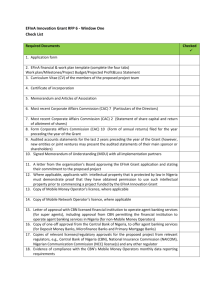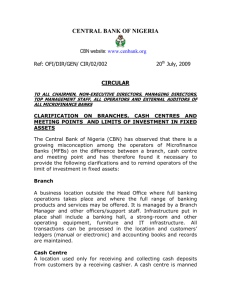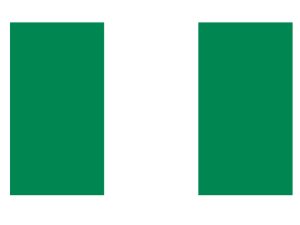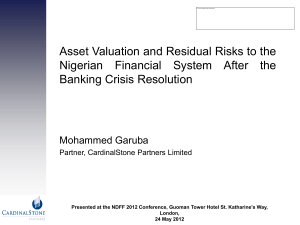Oluwaghenga Odeyemi - First Bank, Nigeria
advertisement
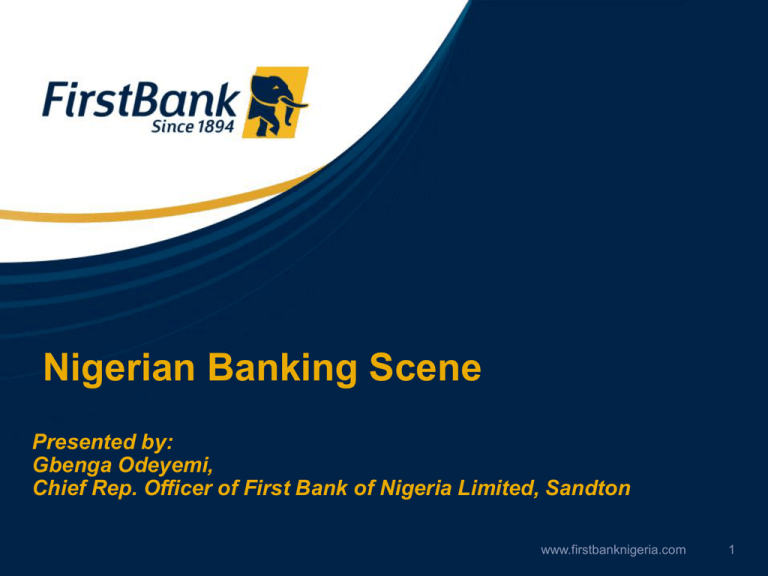
Nigerian Banking Scene Presented by: Gbenga Odeyemi, Chief Rep. Officer of First Bank of Nigeria Limited, Sandton www.firstbanknigeria.com 1 Contents A. B. C. D. E. F. 2 BANKING SYSTEM IN NIGERIA • The Nigerian goal is to become one of the 20 largest economies by the year 2020. • To achieve this economic goal, the country must have a reliable and functioning financial system. • In 2004, there were 89 banks in Nigeria. Most of them were not adequately capitalized. • Central Bank of Nigeria decided in 2004 to raise the capital base of banks from N2 billion to N25 billion. • This resulted into mergers and acquisitions within the industry. • The number of banks reduced from 89 to 24. www.firstbanknigeria.com 3 EFFECT OF GLOBAL ECONOMIC CRISIS • In 2007 – 2009 there was global economic crisis (resulted to global recession). This crisis led to the collapse of many renowned financial institutions. • Divergent views about the impact of the global recession on the Nigeria economy. • It became obvious that Nigeria was not insulated against the global crisis. • The Nigerian stock market collapsed by about 70% in 2008 – 2009. • Many Nigerian banks sustained huge losses as they were highly exposed to the capital market and oil and gas downstream. www.firstbanknigeria.com 4 OTHER REASONS WHY THE NIGERIAN BANKS FAILED IN THE PAST. • Weakness in banks corporate governance • Poor Risk Management/Inadequate Loan policies/ Concentration Risk/ Increase in Non- performing loans • Weak Board and Management Oversight • Inaccurate financial reporting • Non performing Insider- related credits / Unsecured. • Inadequate capital /Negative borrowing from CBN. Capital and Reserve/ Continuous • Insider abuse • Large Volume of Volatile deposits • Mismatch of funds www.firstbanknigeria.com 5 THE NEED FOR FURTHER REFORMS BY CENTRAL BANK OF NIGERIA • The 2005 banking sector reform swept away 13 banks and the number was reduced from 89 to 25 as at 2006. • In 2009, 8 out of the 24 banks were declared insolvent due to huge non – performing loans of about N2.2 trillion ($14.67billion). • It became clear that consolidating the sector in 2006 was not enough. • Proper regulatory and comprehensive supervisory framework had to be entrenched to avoid economic collapse and also restore trust and confidence in the Nigerian banking industry. www.firstbanknigeria.com 6 REFORMS BY CENTRAL BANK OF NIGERIA • Ten banks were intervened and eight had their management replaced. • The CBN provided liquidity and capital support of ₦620 billion (US$4.1 billion) in the form of unsecured, unsubordinated debt. • A guarantee of interbank and foreign credit lines of banks was introduced, and extended for six- monthly periods until end–2011. • The CBN publicly committed to protect all depositors and foreign creditors against loss. • The authorities established the AMCON (Asset Management Company of Nigeria) to support the troubled bank resolutions and the banking industry. • The universal banking model was abolished in favor of a “back-to-basics” model, and a new bank license regime was introduced. www.firstbanknigeria.com 7 REFORMS BY CENTRAL BANK OF NIGERIA cont. • A number of regulatory guidelines were issued, including capital adequacy, related parties and large exposures, risk and risk management, and internal control and auditing. • Prosecution of Directors. • Tenure of Directors of banks. • The CBN issued a Corporate Governance Code to the banks. • The CBN issued a directive on accounting and disclosure practices. • A new supervisory framework was adopted combining risk based and consolidated supervision. www.firstbanknigeria.com 8 REFORMS BY CENTRAL BANK OF NIGERIA cont. • The placing of resident examiners in banks was instituted. • The CBN signed Memoranda of Understanding (MOU) with foreign supervisors geared toward receiving information on the financial condition, and adequacy of risk management and controls, of the various entities of the banking groups that have foreign operations. • Cooperation and coordination between the two agencies involved in banking supervision, the CBN and the Nigeria Deposit Insurance Corporation (NDIC), were strengthened. www.firstbanknigeria.com 9 BANKS IN NIGERIA NO 1 2 3 4 OPERATING BANKS Access Bank Ecobank First City Monument Bank Sterling Bank OPERATING BANKS THAT CHANGED NAMES 5 Enterprise Bank Limited 6 Keystone Bank Limited 7 Mainstreet Bank Limited NO OTHER BANKS 8 Citibank 9 Diamond Bank 10 Fidelity Bank Nigeria 11 First Bank of Nigeria BANK ACQUIRED Intercontinental Bank Oceanic Bank FinBank Equitorial Bank FORMER NAME SPRING BANK Bank PHB AFRIBANK www.firstbanknigeria.com 10 BANKS IN NIGERIA cont. NO 12 13 14 15 16 17 18 19 20 21 22 23 24 BANKS Guaranty Trust Bank Rand Merchant Bank - Merchant bank Skye Bank Stanbic IBTC Bank Nigeria Limited Standard Chartered Bank Union Bank of Nigeria United Bank for Africa Unity Bank Plc. Wema Bank Zenith Bank FSDH Merchant Bank - Merchant Bank (NEW) Heritage Bank Plc. Jaiz Bank www.firstbanknigeria.com 11 THE IMPACT OF REGULATIONS • Bank supervision has improved significantly since the financial crisis. • Confidence in the sector has been restored. • The reform of the sector is a continuous process. • Various Stress tests suggest that most Nigerian banks could withstand extreme shocks. www.firstbanknigeria.com 12 Some Highlights in the banking sector for QTR 3 2014 LOANS AND ADVANCES N8 TRILLION TOTAL ASSETS N25 TRILLION NON PERFOMING LOAN < 5% TOTAL DEPOSIT OF N17 TRILLION www.firstbanknigeria.com 13 Banking Industry: Key Themes New Central Bank of Nigeria Governor took over Mr. Godwin Emefiele Nigeria became the 26th largest economy in the world CBN implemented min. CAR of 15% under Basel II for all banks - October 1 QTR 1 QTR 2 QTR 3 www.firstbanknigeria.com 14 REASONS WHY YOU SHOULD INVEST IN NIGERIA • Abundant Resources: Nigeria has enormous resources, most of which are yet to be fully exploited. They include mineral, agricultural and human resources. • Large Market: With a population of about 170 million people. Over 65% of 170 million Nigerian population is youthful – under 35 years. A booming Middle Class represents nearly 25% of the country’s population. • Free Market Economy • Robust Private Sector www.firstbanknigeria.com 16 REASONS WHY YOU SHOULD INVEST IN NIGERIA Cont. • Free Flow of Investment: Exchange control regulations have been liberalized to ensure free flow of international finance. There is now unrestricted movement of investment capital. • Attractive Incentives: A comprehensive package of incentives has been put in place to attract investment. • Fast Growing and Reliable Financial Sector • Skilled and Low Cost Labour: There is an abundance of skilled labour at an economic cost. www.firstbanknigeria.com 17 OPPORTUNITIES IN NIGERIAN ECONOMY MANUFACTURING www.firstbanknigeria.com 18 THANK YOU FOR LISTENING www.firstbanknigeria.com 19
